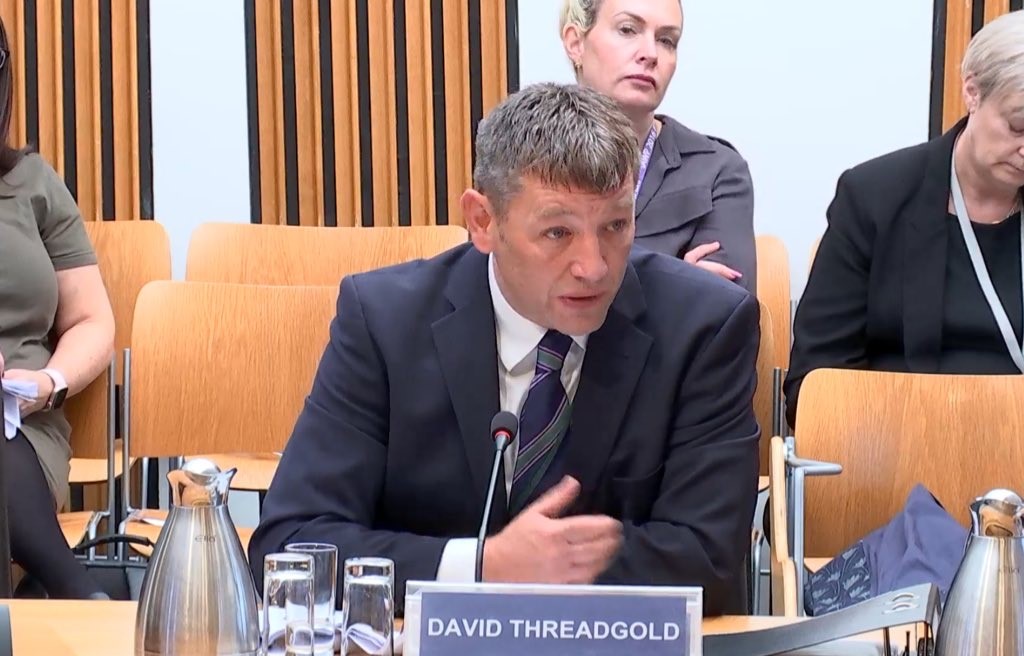At the Scottish Government’s Criminal Justice Committee meeting, David Threadgold, SPF Chair spoke on mental health in policing and said;
“Increasing numbers of people either leave the organisation because they can’t deal with it, or go off sick or onto modified duties because of the consequences of trying to do their best for the people of Scotland.”
The Committee met on 12 September and heard evidence from David, as well as Suzanne Smith, Vice President of the Association of Scottish Police Superintendents, and David Malcolm, Branch Secretary of Unison.
In opening the session, the convenor said: “Recent events have more than demonstrated what the public ask of police officers and staff, and the committee is keen to ensure that they are provided with the support they need.”
David Threadgold said that the force needed to put more preventative measures in place so that police officers were not burning out and suffering from poor mental health, adding that it was “an issue that challenges us every day in the work that we do”.
1,110 Police Scotland officers were signed off work over the last financial year due to stress, depression, anxiety or post-traumatic stress disorder
David said: “A lack of appropriate interaction between Constables and their Sergeants is a key issue in how they deal with the stresses and demands of being in the police”. He said it was important for supervisors to be able to identify if their officers weren’t acting normally.
David said it was “all too easy” for officers to say they didn’t want to get involved with the TRiM programme: “The consequence of that is that my colleagues who perhaps are struggling but don’t want to identify that they are to their colleagues will get missed…I think that if we had better, more efficient, more engaged processes, you’d probably see a great uptake in those who’d benefit from being part of that programme.”
David said there was help available for officers who had hit rock bottom, but that he wasn’t convinced that the force had “the mechanisms and structures in place to be preventative and identify colleagues who are struggling at the start of the journey rather than picking them out at the end”.
He also said that a number of officers hadn’t received the latest training in tactical skills, which was possibly leading to more assaults on his colleagues. He said: “The consequence of that is that my colleagues are going out there without the most up-to-date training…and there is clear evidence that when that is the situation, assaults on police officers increase and there’s a clear link between that and those who are absent with physical or psychological issues.”
The committee discussed the large amount of overtime, partly due to there being the lowest number of officers since 2007 and the pressure to police large sporting events. David said: “If we’re going to meaningfully tackle the wellbeing and the welfare of our officers, [looking at overtime] has to be part of the solution.
“I know the Government will talk about record numbers of recruitment this year, and that is a fact, but what it doesn’t say is that more officers are leaving our organisation every month than it’s possible for us to recruit. The number is on a downward scale at the moment and when you consider that the demand doesn’t go away, it increases the pressure on those who remain.
“And you can be ordered to do overtime. You don’t have the choice, in some circumstances, and all of these things manifest themselves in pressure. We’re just human, at the end of the day. We’re seeing increasing numbers of people who either leave the organisation because they can’t deal with it, or go off sick or onto modified duties because of the consequences of trying to do their best for the people of Scotland.”
In addition, officers were plugging the gaps in other services, responding to mental health-related incidents, as social services and other bodies were understaffed. David said this was “the biggest issue that impacts on our ability to deliver policing across Scotland” and that this kind of work could take up to 60% or 70% of officers’ operational capacity every day.
David told the committee: “I think the one word that would describe our job is ‘relentless’”. He agreed with the committee that there was a “patchwork quilt” of mental health services for officers and that there needed to be more opportunity for officers to decompress and debrief after difficult or traumatic incidents.

